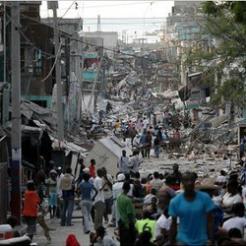As Haiti faces a cholera epidemic, Andrew Chaggar discusses the difficult balance aid workers must strike between building a sustainable future and dealing with a growing emergency situation.
It’s been quite an exhausting month in Haiti. Towards the end of October it was announced that Haiti was facing it’s first cholera epidemic in a century.
The lethal disease was initially confined to the central Arbonite region of the country, but many feared that the disease would spread to the vast slums and camps of Port-au-Prince. With over one million people living with poor or no sanitation the effects of a major outbreak in the densely populated capital could be unbelievably devastating.
While cholera is terrible it can be held in check through good hygiene practices and the availability of clean water. So we immediately made containment a priority by working closely with our partners to deliver cholera workshops, explaining simple preventative measures such as the use of soap and the need to keep human waste away from water sources.
After a week or so it appeared that the combined efforts of many groups were paying off. The number of new cases and deaths slowed.
Sadly a second threat loomed in the form of hurricane Tomas. We anxiously awaited weather updates as Tomas hit St Lucia on its approach. In the end we were spared a direct hit by Tomas, but the storm brought heavy rains and flooding which have exacerbated the cholera situation. Fears of the disease taking hold in Port-au-Prince have now returned as cases have been confirmed in the city.
As I explained last month, Haiti’s initial vulnerability meant January’s earthquake was highly disastrous. The earthquake has, in turn, increased those vulnerabilities and left Haiti even more exposed. The country is now even less able to contain and control the forces that threaten it, and that means the current hazard of cholera will likely wreak more havoc.
As I also discussed last month, vulnerability is closely connected to development status, so to reduce vulnerability we must build Haitian strength and capacity in the long term. But how do you focus on these long term goals when natural hazards and vulnerability can so easily combine to cause further emergency situations which demand immediate attention? In other words, how do we focus on sustainability while making sure we also address the urgent need to battle cholera?
The answer is to try and bridge the gap between relief (short term efforts to save lives) and development (long-term improvements to economic, social and political conditions). The two have traditionally, and still often are, considered as distinct and separate activities.
This separation is evidenced in how activities are funded, planned and implemented. For example budgeting for relief may follow a one year cycle whereas for development five years can be more common. Also there is often a perception that relief comes first, followed by recovery and then finally development.
However as recent events in Haiti have clearly shown this notion of “one-way” progress - that recovery will, or should, proceed in a straight line from relief to development with no back and forth - is fundamentally flawed. This traditional approach has, over the years, been challenged by the concept of “developmental relief”. In simple terms, “developmental relief” involves meeting immediate survival requirements in a way that simultaneously builds longer-term strength.
For example, from the start we have been involving and training local volunteers in how to deliver and present cholera education. This means that the community is learning how to pass on information themselves and continue to educate their communities even after we leave.
Another way we’re working on integrating immediate response needs with our longer-term projects is through building community spaces that can be used to host workshops and other classes.
Very soon after we arrived in Haiti we noticed a distinct lack of community space in our neighbourhood. So we’ve recently built a classroom. This provides a fixed point in the community that we can run long-term projects, like English education, as well as more time critical workshops like cholera awareness when the need arises.
The point I’m trying to make here is that approaches which simultaneously address emergency and long-term needs are both essential and possible. Despite the immediate threat that cholera presents we also have to stay aware and focused on the longer term. Otherwise Haiti will always be facing a disaster.
Andrew Chaggar is one of the eight 2010 Vodafone Foundation World of Difference International winners. To find out more about this opportunity visit the World of Difference website.
Applications for the World of Difference UK programme, delivered by the Vodafone Foundation, opened on Monday 11th October, and gives 500 people across the UK the opportunity to work for their favourite charity for two months and be paid for their time. Applications close on the 23rd November. To find out more and to apply, visit www.vodafone.co.uk/worldofdifference
Picture copyright Peta de Aztlan.









